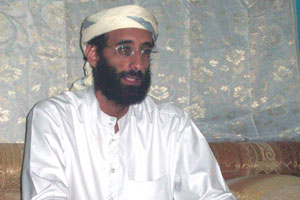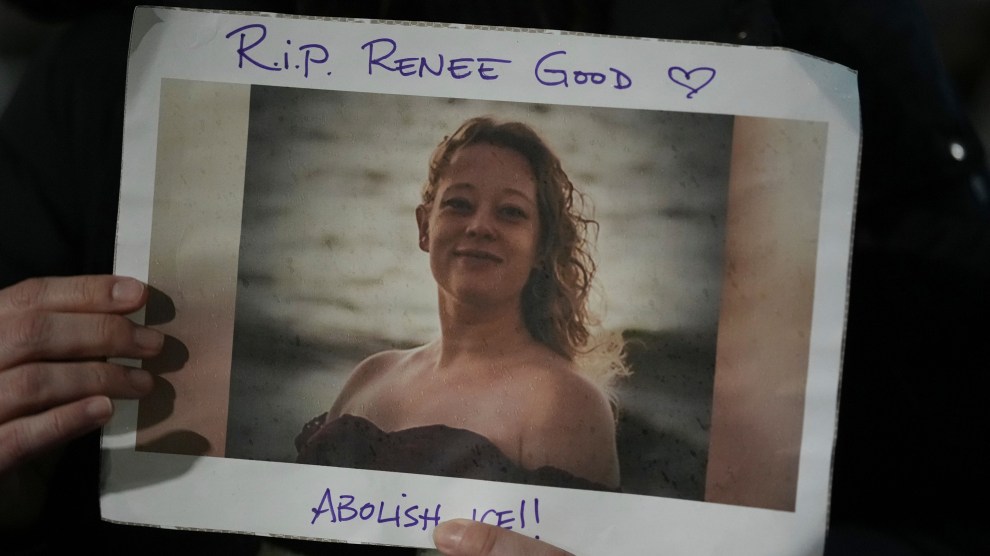
Anwar al-Awlaki | <a href="http://en.wikipedia.org/wiki/File:Anwar_al-Awlaki_sitting_on_couch,_lightened.jpg">Wikimedia Commons</a>.
[Update, August 4: The Treasury Department plans to grant the ACLU and CCR the license they need to sue on Anwar al-Awlaki’s behalf, Politico‘s Josh Gerstein reports. The rights organizations hadn’t received anything by midday, they told Mother Jones on Wednesday. | Update 2, 5:21 p.m. August 4: The rights groups have their license, according to a statement they just released.]
Can accused terrorist Anwar al-Awlaki take the US government to court to prevent the Obama administration from assassinating him? He’s a US citizen, so theoretically he can sue to protect his constitutional rights. But up until now an obscure anti-terror law has prevented al-Awlaki from obtaining American representation—even though two human rights group are prepared to to sue on his behalf to stop the government from killing him.
In February, Dennis Blair, then the nation’s top intelligence official (he resigned in May), admitted that the Pentagon’s Joint Special Operations Command (JSOC) maintains a list of US citizens it is trying to capture or kill. So far, only one person has been identified as potentially on the capture/kill list: al-Awlaki, an American-born Muslim cleric who reportedly had ties to both the Fort Hood shooter and the Christmas Day bomber. Al-Awlaki is believed to be at large in Yemen, where he could potentially be killed by a US strike any day.
But like some other Islamic radicals, al-Awlaki has spent time in the US. He was born in New Mexico, attended Colorado State, and spent years leading Islamic congregations in Colorado and Virginia. And despite the government’s accusations, al-Awlaki’s father, Nasser, has proclaimed his son’s innocence to CNN, saying his son is an “all-American boy” who has been “wrongly accused.” Al-Awlaki is “not Osama bin Laden,” his father says, arguing that the government wants “to make something out of him that he’s not.” On February 2, CNN reported that Nasser al-Awlaki had written to President Barack Obama urging the White House to reconsider its alleged plans to assassinate his son. “I plead again to you that you respect the American law,” he wrote. “If Anwar ever did anything wrong he should be prosecuted according to the principles of American law.”
That’s presumably why Nasser al-Awlaki retained Center for Constitutional Rights and the ACLU to file suit on his son’s behalf.
But just ten days after the groups agreed to work with Nasser al-Awlaki, the Treasury Department put Anwar al-Awlaki on a list of “specially designated global terrorists,” which made it a crime to represent him without a special license from the Treasury’s Office of Foreign Asset Control (OFAC). Unable to proceed with the case, the rights groups put in an urgent request (PDF) for a license, but all they’ve heard back from the Treasury is that their application was received. The ACLU and CCR were in “third or fourth gear several weeks ago,” moving towards suing on Awlaki’s behalf, Anthony Romero, the ACLU’s executive director, told reporters Tuesday on a conference call. But in the wake of the Treasury’s designation, they’re back in “neutral,” he said. So today the groups sued to force the Treasury grant a license. Now, in effect, the two groups are suing the government for permission to sue the government.
Even if the rights groups can get past the OFAC licensing issue, a suit on behalf of al-Awlaki faces several other obstacles. For one, he can’t appear in court—after all, the government’s allegedly trying to kill him. So someone has to appear on his behalf. Next, his legal team would have to prove that the government is actually trying to kill him—and that’s where they’d probably run into a wall, Glenn Greenwald, the blogger and constitutional lawyer, told me in February. (Greenwald has a piece on the latest drama here. A sample: “[I]t’s an incredible spectacle that a lawsuit is being filed with the aim of having Barack Obama enjoined by a Federal Court from killing an American citizen, far away from any battlefield, without any due process whatsoever.” He continues to believe the case will face “serious obstacles.”)
The Obama administration would “almost definitely” try to prevent al-Awlaki’s case from being heard, Greenwald said. Under the “state secrets” privilege, the government could stop al-Awlaki’s case before it began by claiming that even airing the case in court could reveal crucial national security information—like the fact that al-Awlaki’s name is on a hit list.
Still, the court might reject a state secrets claim. While it’s one thing to use the privilege to stop plaintiffs who are seeking redress for past wrongs, it’s “another thing entirely to tell someone who’s seeking an injunction to protect their life” that they can’t do so, Greenwald said. The ACLU’s Jameel Jaffer thinks his team has a strong case against a state secrets claim. “The administration has made no secret of their targeted killing program and their placement of Anwar al-Awlaki on targeted killing list,” he said on the conference call. “It cannot be that the government can implement a program like this, discuss it publicly, and then when it comes time to defend it in court claim [the] state secrets” privilege.
Even if the government’s state secrets claim failed, Greenwald thought a suit by al-Awlaki or another person on the list would still face considerable hurdles. “An argument a court would be more likely to accept is the generalized claim that in a time of war on foreign soil the court shouldn’t interfere with battlefield decisions of the Commander in Chief,” he said.
Although their current fight is with the Treasury Department, CCR and ACLU officials didn’t mince words about President Obama, who’s ultimately responsible for both the “targeted killing” program and the OFAC licensing scheme. “President Obama is claiming the power to act as judge, jury and executioner while suspending any semblance of due process,” Vince Warren, the executive director of CCR, said Tuesday. “Yemen is nearly 2000 miles from Afghanistan or Iraq. The US government is going outside the law to create an ever-larger global war zone and turn the whole world into a battlefield. Would we tolerate it if China or France secretly decided to execute their enemies inside the US? This sets a dangerous precedent for other countries that will only lead to more violence and further diminish the rule of law.”















